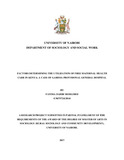| dc.description.abstract | The purpose of this research is exploring the factors determining the use of free maternal healthcare in Garissa County. The study explored the views and characteristics of women in relation to factors that may affect their utilization, particularly those related to their own culture, religion/belief and the role of traditional birth attendant (TBA) whom the women trust more than the healthcare professionals. It also looked into perceived factors related to facilities like quality of services provided as well as those that are linked to health staff like their gender and attitude. The objectives were to determining the link amongst socio-bio traits of women and the use of free maternal healthcare facilities identify types of social support that impact on free maternal healthcare services, investigate how the gender and attitude of health workers affects the use of free maternal healthcare services and determining how the quality of services impacts on the use of free maternal healthcare. The study adopted a cross sectional descriptive survey design targeting women population of reproductive age between seeking antenatal, delivery or post – natal services in Provisional Garissa Hospital in Garissa County. A total of 120 pregnant women and mothers were sampled using stratified sampling technique and purposive sampling where key informants were interviewed. Data was collected using questionnaires and schedule interviews. Data collected was analyzed using both qualitative and quantitative methods. The quantitative techniques comprised tabulation, frequencies, percentages and means using Statistical Packages for Social Sciences software version 18.0.
The study established that mothers who utilized the free maternal care, a higher proportion of them earned higher income of more than 15000 shillings a month compared to those who utilized free maternal care with an income of lower than 6000 shillings. The findings also revealed that majority of mothers had no preference of gender to serve them when seeking maternal care services. The findings revealed that attitude of the staff during delivery process played a vital role as to whether an effective free maternal healthcare would be rendered to women or not.
The study recommended that the government needs to train more Staff, midwives as well as Community Health Workers who links the communities and health facilities locally thereby improve accessibility to free Maternal health care service. The study recommended that the county government needs increase health facilities per capita as well as health workers in the marginal areas for women to access free maternal healthcare services at their localities. Finally the study recommended that health workers need to be provided with incentives as motivational factor to ensure that they willingly serve individuals living in different regions. | en_US |



